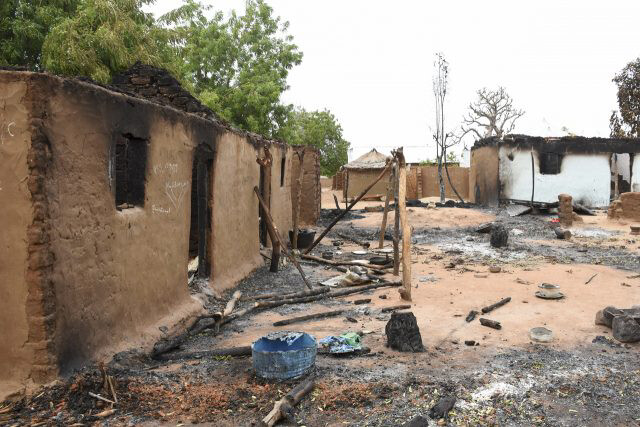
Local government officials reported on Monday that armed groups in central Nigeria have attacked villages, resulting in the deaths of at least 160 individuals.
The death toll increased significantly from the initial 16 casualties reported by the army on Sunday evening in a region beset by religious and ethnic tensions for years.
“As of early hours on Monday, Monday, hostilities that began on Saturday have claimed the lives of as many as 113 individuals,” the president of the local government in Bokkos, Plateau State, Monday Kassah, told AFP.
Kassah stated that military gangs, referred to locally as “bandits,” torched homes and launched “well-coordinated” assaults in “at least twenty different communities.”
He stated, “We discovered over three hundred injured individuals, who were transported to hospitals in Bokkos, Jos, and Barkin Ladi.”
The local Red Cross estimated 104 fatalities across 18 communities in the Bokkos region in its provisional toll.
A minimum of fifty fatalities were also reported in multiple villages located in the Barkin Ladi region, as stated by Dickson Chollom, a state parliament representative.
He denounced the assaults and urged prompt action from the security forces.
“We shall not yield to the strategies employed by these merchants of death.” Chollom stated, “We are united in our pursuit of justice and lasting peace.”
– ‘Barbaric’ – According to local chairman Danjuma Dakil, thirty bodies were discovered in neighboring Barkin Ladi after the assaults that began in the Bokkos region transferred there.
The violence was condemned as “barbaric, brutal, and unjustified” by Plateau State Governor Caleb Mutfwang on Sunday.
“The government will implement proactive measures to halt ongoing attacks against innocent civilians,” said the governor’s spokesman, Gyang Bere.
Late Monday afternoon, gunfire was still audible in the region, which is situated on the dividing line between the predominantly Muslim north and south of Nigeria, according to a source with direct knowledge from the area.
A resident of Mushu village, Markus Amorudu, stated that individuals were asleep when gunfire broke out.
“We were terrified because an attack was not anticipated.” Others were wounded while others were slain as the assailants captured a large number of those who had hid, he told AFP.
In a post on X, formerly Twitter, Amnesty International condemned the government in the aftermath of the attacks, stating that “the Nigerian authorities have failed to end the frequent deadly attacks on rural communities of Plateau state.”
Northwest and central Nigeria have historically been plagued by bandit militias that operate from forested bases in the region’s depths, storming villages to pillage and abduct inhabitants for ransom.
Intensified by climate pressures and rapid population growth, competition between farmers and nomadic herders for natural resources has also exacerbated social tensions and prompted violence.
Northeastern Nigeria has been beset by a jihadist conflict since 2009, which has resulted in the deaths of tens of thousands of individuals and the displacement of approximately two million as Boko Haram vies for power with rivals affiliated with the Islamic State.
In an effort to address its persistent security challenges, former Lagos governor and current President Bola Ahmed Tinubu, who was elected in February in a fiercely contested election, has pledged to increase investment in Africa’s largest economy and most populous nation.